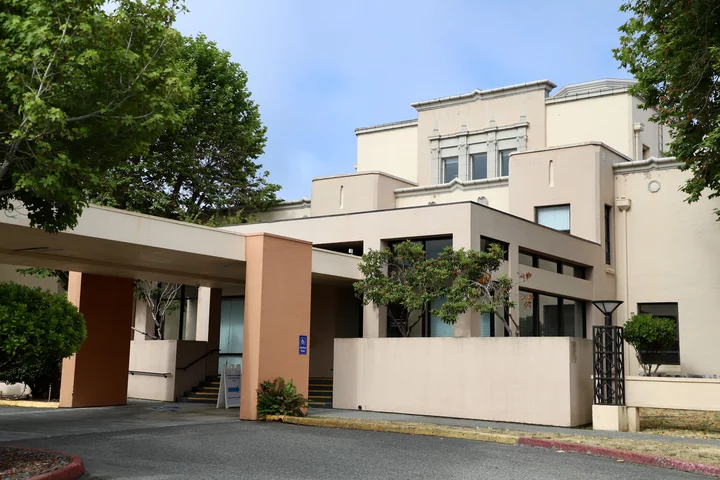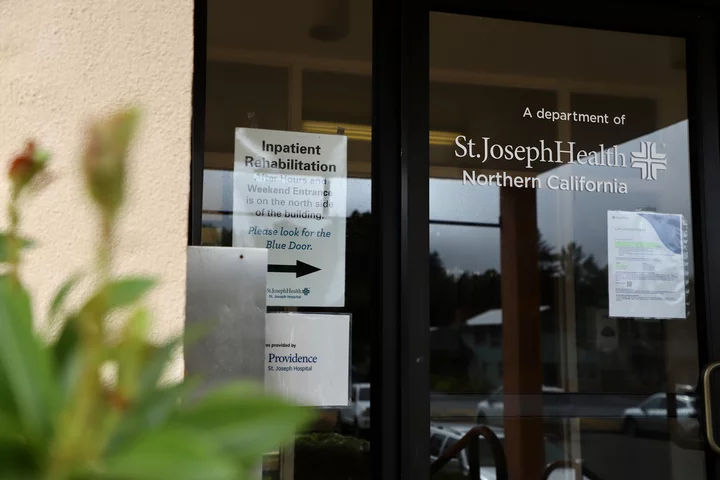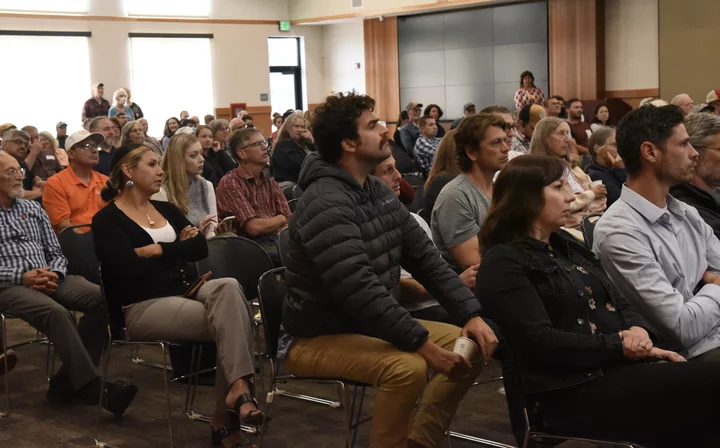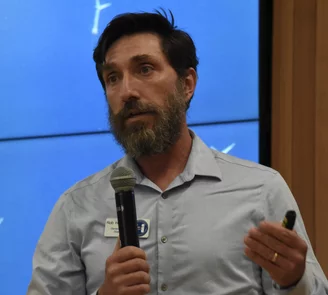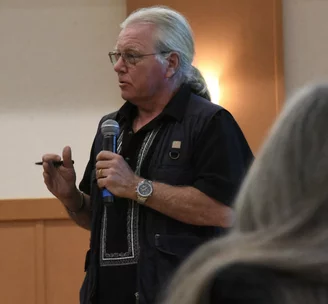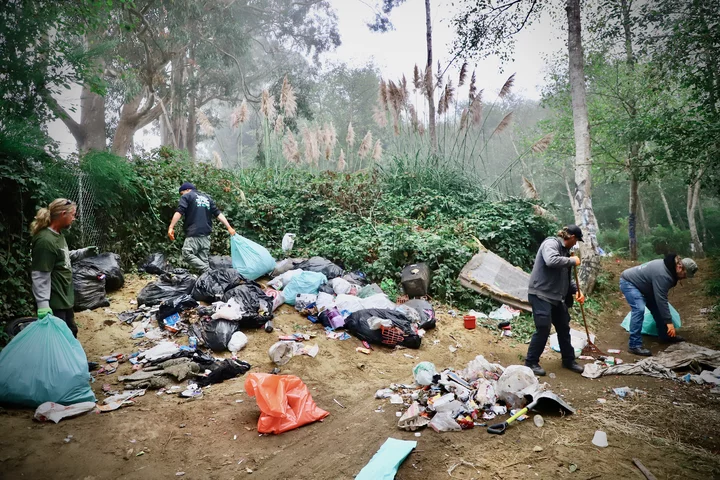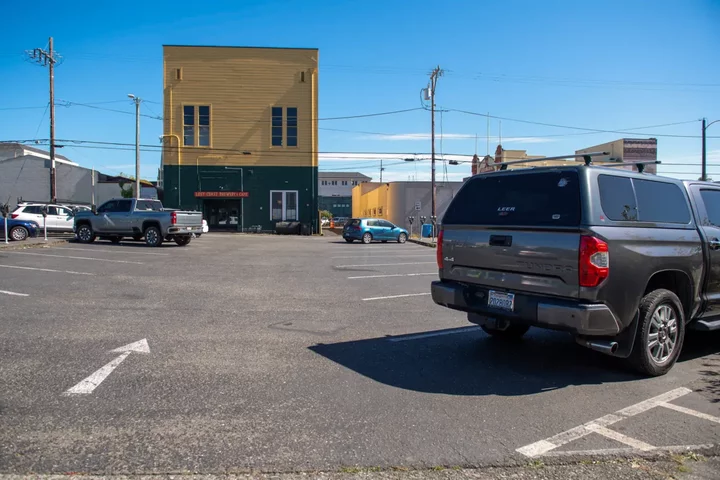Partly Built New Acute Rehab Building at Redwood Memorial Scrapped, and Providence Employees Say Inpatient Rehab May Be Eliminated Altogether
Ryan Burns / Thursday, July 25, 2024 @ 3:52 p.m. / Health Care
The General Hospital Campus, located north of Providence St. Joseph Hospital on Harrison Avenue in Eureka, currently houses the only inpatient rehabilitation facility in the city. The building does not meet the state’s current seismic standards. | Photos by Andrew Goff.
###
More than six years after Providence broke ground on a brand new, 12,000-square-foot Acute Inpatient Rehabilitation Addition at Redwood Memorial Hospital in Fortuna, construction has been halted, and plans to complete the facility have been canceled.

The inpatient rehabilitation unit is among a variety of patient services still being offered in the General Hospital campus.
Meanwhile, Providence employees at St. Joseph Hospital in Eureka say the existing inpatient rehabilitation unit, which is housed inside the old General Hospital campus, just north of the main St. Joseph Hospital facilities on Harrison Avenue in Eureka, may soon be eliminated, too — though they’ve been unable to get confirmation from management.
Rumors of these developments started spreading on social media about two weeks ago, as registered nurses and other Providence employees reported that jobs and services may soon be eliminated.
“The CEO [Michael Kelemen] told us they have stopped building at Redwood Memorial and do not anticipate restarting that building,” said one hospital employee who spoke to the Outpost on condition of anonymity for fear of losing her job. (We’ll call her Jennifer.)
The inpatient rehabilitation unit — which is where occupational therapists, physical therapists and other care providers help patients recover from strokes, surgeries, physically debilitating accidents and more — is among a variety of services still being offered in the old General Hospital campus. Jennifer said the unit employs roughly 40 people, including case managers, social workers, speech therapists, physical therapists, occupational therapists, registered nurses, dietitians and more.
But the General Hospital building doesn’t meet the State of California’s current seismic standards. Providence, the not-for-profit Catholic health care system that took over St. Joseph Health in 2016, previously estimated the cost of seismic retrofits at its Humboldt County facilities alone at more than $180 million.
Construction of the new facility in Fortuna proceeded in fits and starts over the least eight years, but Jennifer and other employees reached by the Outpost said costs ballooned during COVID and skyrocketed even higher in recent years.
“So we don’t know much — just that admin went around to a couple huddles and told them they’re abandoning the construction project at Redwood,” said Julia Minton, an organizer and membership representative with the National Union of Healthcare Workers (NUHW).
“From there, people kind of run with that information,” Minton said. “We also heard that Providence is on an extension, [that] they got a variance to continue operating [from inside General Hospital] past the state deadline because it had that plan in place.”
This variance for compliance with state seismic regulations was contingent on active construction of the new facility, so when word came that the project is being abandoned, “that’s where people jumped to the assumption that General Hospital is getting closed now or by end of year,” Minton said.
We sent Providence a list of questions via email, asking specifically whether the local inpatient rehab unit will be closed and, if so, where patients who need those services might be sent, how many employee positions will be eliminated, and when these changes might happen.
In response, an L.A.-area Providence spokesperson named Patricia Aidem sent a statement that didn’t really answer those questions, though she did confirm that the construction at Redwood Memorial will not be completed:
Providence St. Joseph Hospital, Eureka, like all other hospitals in California, is subject to meeting structural seismic compliance standards by 2025. We have communicated with caregivers and the community that the General Hospital campus is not seismically compliant, requiring services to be discontinued in those buildings by the end of 2024.
We are proactively collaborating with the State to keep them informed of progress toward compliance, which included the relocation of the Acute Rehabilitation Unit to Providence Redwood Memorial Hospital in Fortuna.
Due to several external factors, we are unable to move forward with the project at Providence Redwood Memorial Hospital.
We’ve engaged internal stakeholders and community members to identify potential solutions to maintain this critical service in Humboldt County and are currently exploring the options.
We are committed to keeping our caregivers and the community informed as we navigate this process and determine the most effective way to move forward.
The Outpost called Aidem late last week in hopes of getting more details, but when we asked whether St. Joseph Hospital’s inpatient rehab unit will be closed she said she couldn’t answer that. Why not?
“Because I’m sitting about three or four hundred miles south of there,” she said. “This is what I was advised to share with you.”
On Monday we emailed local Providence spokesperson Christian Hill, hoping he might have more information. He responded via email earlier today, saying simply that the above statement “is our most up to date information.”
Local employees say they’ve also been left in the dark, and they’re not happy about it.
“It is absolutely cruel of the hospital to treat its staff in such a disrespectful way, not letting them know what their future is,” Jennifer said. “They are neither confirming or denying that the unit is closing.”
Minton said she’s been unable to get answers, either. “I have been feeling very much like Donald Rumsfeld,” Minton said, referring to the former Secretary of Defense’s oft-quoted remarks about “known unknowns” and “unknown unknowns.”
“It’s really disrespectful,” Minton said. “People are freaked out.”
The rumor mill among local health care workers has been further fed by a leaked July 1 memo from Granada Rehabilitation & Wellness Center in Eureka to its employees. The memo, signed by administrator Alice Brasier, announces a new collaboration with “Providence Hospital” on a “rehabilitation enhancement program called The Step-Down Unit.”
Reached by phone last week, Brasier said she had no comment on the memo or the collaboration with Providence.
Minton said this memo “freaked a lot of people out,” though she suspects that the new step-down unit it references is probably not intended as a replacement for Providence’s existing inpatient services. Nevertheless, she said, the prospect of collaborating with a skilled nursing facility (SNF) has local nurses and providers worried.
“Every physical therapist and occupational therapist I’ve spoken to does not want to see us partnered with a SNF,” Minton said, “mostly because they’re terrible operators. They’re not good institutions, especially the ones we have locally. They’re unabashedly greedy.” (See news reports here, here and here for more info on that.)
A sign directs patients to the inpatient rehab unit inside the old General Hospital building.
We shared a copy of Providence’s PR statement with Jennifer, who took particular notice of the part claiming that administrators have “engaged internal stakeholders and community members.”
“I don’t know who’s a bigger stakeholder than the staff who’ve been on that award-winning unit and the patients we serve,” she said.
Established in 1987, the Acute Inpatient Rehabilitation Program has cared for almost 10,000 patients from across Humboldt County and beyond, according to Providence. The program treats conditions such as major trauma injuries, brain injuries, amputations, neurological disorders, burns, spinal cord injuries and more. In 2020, the program ranked in the top tier nationwide for overall patient satisfaction.
“Its value is priceless for the community,” said Bonnie Hamant, a registered nurse who works at the facility. “By community I mean from Fort Bragg to Hoopa and all areas in between. What we have been able to give to patients is their independence and life back. Nothing is more precious for a patient recovering than to see a positive future, not a nursing home wall.”
Jennifer said she’s heard that Providence may either collaborate with a local skilled nursing facility or rely on regional support by sending patients (and maybe some of their family members) down to Queen of the Valley Medical Center in Napa or the Providence-run hospital in Santa Rosa.
Neither would be an adequate substitute for the services offered locally for the past 37 years, she said.
“I personally am afraid that this is just another notch of what they’ll do,” Jennifer said.
“Providence does this every time,” Minton agreed. She referred specifically to the closure of Providence’s outpatient labs earlier this year and the 2021 closure of the birthing center at Redwood Memorial. In each case, Providence promised that no jobs would be lost. Minton said that while that may technically be true, employees were typically offered lower wages for new positions that required entirely different skillsets.
“One LDN [labor and delivery nurse] affected by the Redwood closure, they turned around and offered her a nursing assistant position, which was a third of her salary pay cut and a huge demotion,” Minton said.
Minton was hopeful that she’d get more information today. She texted the Outpost this afternoon with this update: “All we got from the hospital today is, continuing construction at redwood is not viable. And that they are committed to keeping services in the area whether operated by St Joes/Redwood or in partnership with another entity. 🤷”
I texted back: “I wonder what they consider ‘the area.’”
“We wonder the same,” Minton replied.
BOOKED
Yesterday: 4 felonies, 11 misdemeanors, 0 infractions
JUDGED
Humboldt County Superior Court Calendar: Today
CHP REPORTS
1740 Mm96 E Hum R17.40 (HM office): Traffic Hazard
Myrtle Ave / Harrison Ave (HM office): Defective Traffic Signals
ELSEWHERE
RHBB: Wet Winter, Dry Reality? Humboldt Officials Say Water Risk Isn’t Gone
RHBB: College of the Redwoods Del Norte Campus Project Moving Forward with Measure I Funding
RHBB: Major Roadwork Scheduled Friday, February 6 through Thursday, February 12
Fishing the North Coast : Finally — Rain on the Way for North Coast Steelhead Rivers
Hill Fire Personnel Say Conditions are Improving, but Warn It’s Still Quite Hot and Dry for July
Gillen Tener Martin / Thursday, July 25, 2024 @ 3:05 p.m. / Fire
Photo: Hill Fire Incident Command Flickr
Last night, incident commanders and personnel working the Hill Fire hosted a community meeting at the Willow Creek Bible Church to provide updates on the blaze that began July 15.
As of last night, the fire was 7,050 acres at 14% containment, according to Operations Section Chief Kerri Williamson.
The outlook provided was largely positive, but presenters stressed that July is early days in the fire season. Six Rivers Forest Supervisor Ted MacArthur made clear that conditions remain toasty.
“This has been very robust fire behavior conditions for this time of year considering the type of winter we had,” he said. “It’s been hot and it’s dry and it’s still July, we’ve got several months in front of us.”
The first presentation of the night was an operational update from Deputy Operations Section Chief Loren Monsen, who said the southern end of the fire has been “holding”; the western border, moving up toward Spike Buck Mountain, is looking “really good”; and the fire’s northern border is also holding and looking really good.
After Monsen, Williamson spoke about a half-acre spot fire yesterday evening near the fire’s northeast boundary and trees that ignited Tuesday on the eastern front that resulted in spread toward Sugarloaf Mountain. Williamson said helicopters and aircraft carrying retardant were utilized all of yesterday in spot fire containment efforts.
Incident Meteorologist James White, whose role is to provide localized weather information and forecasts to aid strategy (which he is accomplishing in part through launching weather balloons), and Fire Behavioral Analyst Kevin Osborne then spoke on the conditions experienced thus far and gave an outlook for the next few days.
White noted that some weather stations locally – including in Hoopa and Willow Creek – saw the highest temperatures ever recorded during the early July heatwave which, combined with lightning and strong winds, led to the fire’s early activity.
He said that lower temperatures and more moisture are expected to help firefighters out through next week.
Osborne’s presentation concurred. He shared that while the fire danger index in the days preceding the lightning storm that ignited the blaze set all-time records, which allowed the fire to grow as fast as it did, the coming days look good.
Like MacArthur, Osborne also noted that fire conditions remain “robust” for July.
“We’re not out of the woods yet, we’re early in the season,” he said.
Osborne also pointed out that the blaze’s positioning between Mosquito Creek and the South Fork of the Trinity River, both of which have strong winds, has presented added challenges in containment. Spot fires remain the largest concern, according to Osborne.
Fifth District County Supervisor Steve Madrone, who attended the meeting virtually, chimed in to ask for a round of applause for the firefighters and other personnel before Unified Incident Commander Rocky Opliger closed presentations by thanking the community for the welcoming reception firefighters in town have received.
Questions from the audience that followed the presentations focused primarily on evacuation orders and structure protection.
“We have a lot of elderly people, we have a lot of people without a lot of income that just need some help and they need to know that someone’s going to be there,” one speaker said, adding that the lack of communication he said he’s experienced around structure protection for properties under evacuation orders has been “a little disconcerting.”
Williamson explained that additional evacuation orders were put in place when the fire moved toward Sugarloaf and said that Unified Command does have a structure protection plan in place.
The ongoing Hill Fire response is a unified Cal Fire and the Forest Service effort that currently involves 1,920 personnel.
Last night’s meeting was live streamed on Facebook, and the video can be found here.
( : / )
Andrew Goff / Thursday, July 25, 2024 @ 12:35 p.m. / :)
Yes, today LoCO saw the smile-ish face in the sky too. We are community.
# # #
UPDATE: Humboldt’s favorite pilot penman Caleb Lesher reached out to LoCO to let us know that today’s round of sky scribbles were a way to promote the upcoming Rumble Over the Redwoods airshow which takes place Aug. 10 and 11 at ACV. Consider the word spread, sir.
PREVIOUSLY:
(VIDEO) See What Wind Turbine Assembly Would Look Like on Humboldt Bay, Courtesy of This Presentation From the Harbor District
Isabella Vanderheiden / Thursday, July 25, 2024 @ 11:50 a.m. / Infrastructure , Offshore Wind
Around 200 hundred community members filled the Sequoia Conference Center on Tuesday to take a gander at a draft simulation of the heavy-lift marine terminal project in action. | Photos: Isabella Vanderheiden.
###
In about six years time, massive floating wind turbines – nearly as tall as the Eiffel Tower – could line the shores of the Samoa Peninsula.
At a special meeting on Tuesday, staff with the Humboldt Bay Harbor, Recreation and Conservation District unveiled a draft simulation showing how the Humboldt Bay Offshore Wind Heavy Lift Marine Terminal – the staging and integration facility where the gigantic wind turbines components would be fully assembled – would transform our view of the bay.
The floating turbines slated for the Humboldt Wind Energy Area, located roughly 20 miles west of Eureka, would be among the largest in the world, according to Harbor District Development Director Rob Holmlund. Each turbine tower would be mounted on a floating triangular platform, itself measuring 100 feet tall and up to 425 feet long per side. The turbine would stand at roughly 1,000 feet – about the size of the Eiffel Tower – from the ocean surface to its wing tips. Each blade is as long as a football field.
A digital rendering of the fully built-out Humboldt Bay Offshore Wind Heavy Lift Marine Terminal. Image courtesy of the Harbor District.
“These are the dimensions of the turbines that you’ll see in the simulation,” Holmlund said at Tuesday’s meeting. “We decided to go with a more conservative approach and simulate a more significant potential impact. … The most important dimension here is the floating foundation. You really can’t get any bigger with our project than 425 feet inside of that triangle. … There may be future simulations where you see something smaller, but it’s unlikely that you’ll see simulations bigger than what we’re about to show you.”
Out of 137 potential simulation locations around Humboldt Bay, Harbor District staff narrowed it down to six to “represent different orientations and distances,” Holmlund said. The simulation includes views from the Eureka Waterfront at Livin’ the Dream Ice Cream, the parking lot at the Arcata Marsh, Manila Park on the north end of the Samoa Peninsula, the USS Milwaukee Memorial directly across State Route 255 from the project site, Fort Humboldt State Park and Table Bluff County Park.
Holmlund clicked through each simulation, as seen in the video below, starting with a current view of the project site. With each click a red crane appeared, then a turbine under construction and, finally, a completed turbine. A woman in the audience could be heard whispering, “This makes me sick.”
“It’s important to note that a sunny day is needed for you to see this project from a particular distance,” Holmlund said. “Another thing to consider: throughout the vast majority of Eureka and Arcata you won’t be able to see this project because of buildings. … The general rule of thumb is if you can see the smokestack, you’ll be able to see the project.”
Once the heavy-lift terminal is fully operational, which could be as soon as late 2029, Holmlund said the facility would have the capacity to assemble two turbines per week. The turbines will hang out in wet storage for an undetermined amount of time until they’re ready to be towed out to sea.
“From there [the turbines] can either go to Morro Bay, Oregon, or the Humboldt lease areas,” Holmlund said. “Once it leaves Humboldt Bay, that’s the end of our part of the project.”
Holmlund noted several times during his presentation that the simulation was preliminary and subject to change. For example, this simulation did not depict the district’s plans for wet storage.
During the Q&A period, several community members asked about the lifespan of the project and whether it would be rendered useless once the wind turbines were assembled.
“With California’s offshore renewable energy goals, as well as Oregon and Washington, it’s likely that there will be multiple decades of construction of wind turbines [in Humboldt Bay],” Holmlund said. In addition, wind turbines that are already out in the ocean will need to be towed back into the bay periodically for maintenance. “It will be an ongoing project. … It can also be used for other projects in the future.”
Others asked what the Harbor District is doing to mitigate the noise associated with the project. “Will [the facility] be operating 24 hours a day?” one audience member asked. “When forklifts are operating they make that ‘beep, beep, beep’ noise when they’re backing up. I want to hear about that.”
In short: It’s a work in progress.
“It is possible that the project could be 24/7 operations,” Holmlund said. “We are evaluating sound walls to minimize sound impacts. We are also holding a number of neighborhood-specific meetings with people who live been close by … . And yes, the industrial facility will have backup beepers. We’re still conducting noise studies, and that’ll be part of what we’ll release in a couple of months.”
Audience members also brought up concerns about soil testing and the “toxic sludge” buried deep in the bay. Holmlund said the district will take samples of the dredge material, which will be sent off to various regulatory agencies for “complex chemical analysis,” but emphasized that the project will not require the district to deepen or widen existing channels in the bay.
“If there is contaminated material … then it has to be disposed of at a special landfill, but we’re not anticipating that,” he continued. “To my knowledge, there haven’t been any large dredging events in Humboldt Bay that were heavily contaminated. I’m not an expert on that but we have a world-class consultant specialized in that work.”
Someone else in the audience asked if the entire project would be scrapped if former President Donald Trump were to win the upcoming election. On several occasions, Trump has said he would stop federally-led offshore wind development projects “on day one” of his presidency.
“Could a different president alter the trajectory of this? Probably,” Holmlund said. “California is still going to have its renewable energy goals, but the federal grants that we got [could] be rescinded by a change in the administration. It’s a possibility but climate change isn’t going to stop and we have to find some sort of renewable energy path forward.”
During the public comment portion of the meeting, several audience members asked the Harbor District to pump the brakes on the project.
“I think you’re going too fast on this, and when you go to fast, things can happen,” said former Wiyot Tribal Chair Ted Hernandez, who noted that he was speaking as a Wiyot man, not as a member of the tribal council. “You don’t know what’s going to happen 20 years from now, you don’t know what’s going to happen to our bay, but I have to protect it because of Tuluwat. That’s our home. And when we’re doing ceremony, I don’t want to see these big towers overhead because then our prayers won’t get answered and lifted up to Creator. … I think there needs to be more studies before we push this forward.”
Others expressed concern that Humboldt County is just being used as a “guinea pig” for offshore international offshore wind developers. Some spoke to the greater issue of climate change and the need for a diverse array of renewable energy resources.
“In the United States, we burn a billion tons of coal every year. Every single year. That translates into over three million tons of carbon dioxide going into the atmosphere,” said local resident Matthew Socha. “Coal is absolutely the dirtiest, worst, most poisonous form of electricity we’re producing. Anything we can do to take a bite out of that [industry] is going to be helpful. … It will take a combination of things and different alternative resources. This [project] is a part of the puzzle.”
Matt Simmons, a climate attorney with the Environmental Protection Information Center (EPIC), acknowledged that there are many, many questions surrounding the port project and offshore wind development as a whole. “Everyone is still learning.”
“I think it’s actually super helpful and important that we’re having these visualizations so early in this process to help us learn as much as we can about this project,” he said. “I’m hearing a lot of questions from everyone about offshore wind, and you’re not alone. It’s different.”
EPIC, in partnership with the Redwood Region Climate and Community Resilience (CORE) Hub and the Humboldt Waterkeeper, recently launched a website to help answer some of the community’s questions about offshore wind development. Simmons urged attendees to check it out. “I’m not saying you have to support or oppose the project. What I’m saying is let’s all get educated.”
Check out the video below for Holmlund’s full presentation. More information on the heavy-lift marine terminal project can be found here.
###
###
PREVIOUSLY:
- Harbor District Announces Massive Offshore Wind Partnership; Project Would Lead to an 86-Acre Redevelopment of Old Pulp Mill Site
- Offshore Wind is Coming to the North Coast. What’s in it For Humboldt?
- ‘Together We Can Shape Offshore Wind for The West Coast’: Local Officials, Huffman and Others Join Harbor District Officials in Celebrating Partnership Agreement With Crowley Wind Services
- Crowley — the Company That Wants to Build a Big Wind Energy Facility on the Peninsula — Will be Opening Offices in Eureka
- Harbor District to Host Public Meeting Kicking Off Environmental Review of Offshore Wind Heavy Lift Marine Terminal Project
- Humboldt Harbor District Officials Talk Port Development As Offshore Wind Efforts Ramp Up
- County of Humboldt, Developers Sign Memorandum of Agreement in a ‘Momentous Step Forward’ for Offshore Wind Development on the North Coast
- Harbor District Responds to Crowley Controversy, Commits to the ‘Highest Ethical Standards’
- LoCO Interview: The Outpost Talks to Crowley Executives About Recent Allegations of Misconduct, Port Development on the Samoa Peninsula and the Company’s Future in Humboldt
- Harbor District Board of Commissioners to Discuss Proposed Offshore Wind Terminal Project, Lease Agreement With Crowley During Tonight’s Meeting
- (UPDATE) Huffman Announces $8.7 Million Federal Grant Toward Offshore Wind Port Development
- Harbor District Commissioners to Discuss Extended Partnership Agreement with Crowley Wind Services During Tonight’s Meeting
- WHOA: Rep. Huffman’s Office Teases $426 Million Federal Grant for Offshore Wind Terminal, to be Announced Tomorrow
- (PHOTOS) The Biggest Federal Grant in Humboldt History? Huffman, Assorted Worthies Gather on Woodley Island to Celebrate $426 Million in Infrastructure Funding for Offshore Wind
- At a Two-Day Conference in Eureka This Week, North Coast Tribes Advocate for ‘Meaningful Engagement’ With Offshore Wind Developers, Federal Regulators
- Crowley Wind Services’s Partner Agreement With the Harbor District Will Expire Without a Lease, Leaving Future Relationship Unclear
Sheriff’s Office Identifies Two Men Killed in Kneeland Plane Crash Earlier This Week
LoCO Staff / Thursday, July 25, 2024 @ 11:18 a.m. / Crime
PREVIOUSLY:
- (VIDEO) Aircraft Crashes Near Kneeland Airport, Sparking Fire
- Two Killed in Kneeland Plane Crash, Sheriff’s Office Confirmed; Additional Details Released
###
Press
release from the Humboldt County Sheriff’s Office:
The Humboldt County Coroner’s Office has confirmed the identities of two deceased individuals following the fatal plane crash that took place near the Kneeland Airport around 11:15 a.m. on Tuesday, July 23.
The Cessna’s pilot has been identified as that of 49-year-old Gabriel Joshua Kulp of Grass Valley, Calif. The passenger, a helicopter mechanic, has been identified as 60-year-old Thomias Edward Smith of Carmichael, Calif. At this time, only these two bodies have been recovered from the wreckage.
Next of kin has been notified. An autopsy will be completed in the coming days to confirm cause of death. The cause of the crash remains under investigation by the National Transportation Safety Board (NTSB) and the Federal Aviation Administration (FAA). The NTSB can be contacted at (202) 314-6000.
The Humboldt County Sheriff’s Office extends our deepest condolences to the families of those lost in this tragic accident.
Newsom Orders State Agencies to Clear Homeless Encampments
Marisa Kendall / Thursday, July 25, 2024 @ 9:50 a.m. / Sacramento
A 2022 homeless encampment “cleanup” off Eureka’s Sixth Street. File photo: Andrew Goff.
Gov. Gavin Newsom today ordered state agencies to remove homeless camps throughout California, his first major show of force since the Supreme Court granted state and local authorities more power to clear encampments.
Newsom’s executive order mandates that state agencies and departments adopt policies to clear camps on state property. It also encourages local governments to do the same.
“This executive order directs state agencies to move urgently to address dangerous encampments while supporting and assisting the individuals living in them — and provides guidance for cities and counties to do the same,” Newsom said in a news release. “The state has been hard at work to address this crisis on our streets. There are simply no more excuses. It’s time for everyone to do their part.”
The move comes almost a month after the U.S. Supreme Court upended six years of protections for residents of homeless encampments in California and other western states. Previously, cities were prohibited from punishing people for sleeping outside if they had nowhere else to go. As a result, local courts ordered several cities, including San Francisco, to halt or pause encampment sweeps.
Reversing that precedent in Grants Pass v. Johnson, the justices last month found it is not unconstitutional for a city to ban homeless encampments, even if there is no shelter available. The ruling, which Newsom cheered, gives city leaders broad authority to crack down on camps.
Per Newsom’s new order, state agencies are to model their encampment policies around one that Caltrans has used for several years to remove camps on highway on and off ramps, under overpasses and on other land maintained by the transit agency. State agencies should warn residents at least 48 hours before clearing a camp. They also are required to store residents’ belongings for at least 60 days, and to request services for displaced residents from local organizations. If an encampment poses an “imminent threat” to life, health, safety or infrastructure, the agency can remove a camp immediately.
Caltrans has cleared 11,188 encampments since July 2021, according to the governor’s office. Newsom has personally attended some of those cleanups, wearing a baseball hat and gloves to help pick up trash left behind.
But Caltrans has faced backlash for the way it handles encampment cleanups. In 2020, the agency agreed to pay $5.5 million to settle a lawsuit that accused it of destroying property belonging to homeless Alameda County residents.
Newsom took a softer tone with local governments, urging them to voluntarily adopt policies similar to the one used by Caltrans. He also promised the state, via the California Interagency Council on Homelessness, will provide guidance and technical assistance to help local leaders set up programs.
It’s unclear how the order will be enforced, and whether there will be any penalties for cities and counties that don’t ramp up efforts to clear homeless camps. Newsom could withhold funding from local governments that he feels are not meeting his expectations, as he’s done in the past. In 2022, he briefly rescinded $1 billion from cities and counties after accusing them of failing to take big enough steps to reduce homelessness.
CalMatters has requested additional details from the governor’s office regarding the scope of his executive order and how it will be enforced, and will update this story with more information.
###
CalMatters.org is a nonprofit, nonpartisan media venture explaining California policies and politics.
When California Housing Regulators Beef With Voters, Who Wins?
Ben Christopher / Thursday, July 25, 2024 @ 7:44 a.m. / Sacramento
The parking lot on 3rd Street between G and H Streets in Eureka on June 17, 2024. The lot is the site of a proposed Humboldt Transit Authority Hub that would include housing. Photo by Mark McKenna for CalMatters
In November, voters in Eureka will decide whether to scrap a housing development plan that was approved by California housing regulators in 2020 — and, in the process, risk thumbing their noses at Sacramento.
City planners in the Humboldt County town have spent years figuring out how to lay the ground for nearly 1,000 new units by the end of the decade, a quota they’ve been assigned by California’s Housing and Community Development Department. A key pillar of the city’s plan is to convert a dozen of the city’s public parking lots into affordable housing projects.
That big idea triggered a local political firestorm over the proposed housing, the loss of parking and the very future of Eureka. Hence the November ballot measure, which would slap costly new parking requirements on those proposed lot-to-home conversion projects and direct development to an abandoned middle school on the far end of town.
The fight over Eureka’s parking lots is distinctly Eureka in many of its details, but the broad contours of the story are familiar. Over the last half decade, state lawmakers have passed dozens of new laws requiring local elected officials to approve more housing, whether they want to or not. Regulators and the state’s Department of Justice have grown increasingly unyielding. Lawsuits in Huntington Beach and La Cañada Flintridge and legal settlements in Fullerton and Coronado speak to the new regulatory reality.
What makes the housing kerfuffle in Eureka unusual is that it’s not local elected leaders who are contesting state regulations. In November, it could be the voters themselves who give the state-sanctioned plan the boot.
If they do, that could put the city in unsettled legal waters. As more state-imposed housing deadlines creep up, other California cities may soon find themselves similarly adrift.
Mixed messaging from the courts
For decades, California slow-growth advocates have used the citizen initiative process to hold back the tide of unwelcome development. An analysis published by a Bay Area think tank and development advocacy organization, SPUR, identified 208 successful local initiatives that restricted housing construction between 1973 and 2023.
Eureka occupies a special place in that history. In 1949, city officials voted to use federal funding to build “low-rent” housing reserved for veterans. The local backlash spawned a statewide campaign that ultimately added Article 34 to the state constitution, a provision that gives local voters veto power over new public housing projects. Seventy five years later, housing advocates still haven’t managed to expunge that provision from state law.
But the political sway of the anti-development voting bloc may have started to wane. Since 2022, majorities in Menlo Park, Laguna Beach, Santa Cruz, Costa Mesa and Nevada City have either rejected anti-development measures or passed initiatives to roll back prior ones.
If Eureka voters buck that recent trend and turn out to preserve the parking lots, recent judicial precedent doesn’t offer a clear view of what might happen.
Judges have ruled that when local restrictions — even those passed by popular vote — make it impossible to abide by state housing requirements, the state laws tend to win out. But in cases where local restrictions don’t make it impossible, but simply more costly or more complicated, for cities to follow state decrees, guidance from the courts has been inconsistent.
Encinitas, in San Diego County, has been ground zero of this judicial confusion. The city has a law on the books requiring voter approval of any major change to housing and land use policy. When in 2016 the city put its state-mandated housing development plan up for the electorate’s approval, the voters rejected it. The city tried again in 2018 and again, voters refused to cooperate.
Finally, a local judge stepped in, writing that “the Court is required to find a way out of the impasse” and let the plan go forward over the electorate’s objections. But when the city itself turned back to the court, asking it for permission to ignore the electorate for all future housing plans too, another judge refused. The first ruling, which suspended the voters’ referendum power, was evidently only a one-off — and only after the voters had given the “wrong” answer multiple times.
The politics of saying no
Such legal ambiguity has put some cities in the tough position of having to choose which law to follow and which to break.
In 2021, the city of Alameda, caught between a state requirement to permit more housing and a local ballot initiative, reaffirmed by voters in 2020, that effectively banned the construction of any apartment buildings on the island, simply decided to ignore the will of the electorate.
That conundrum is likely to crop up for cities across the state. Sausalito, across the bay from San Francisco, may have to reconsider a voter-enacted waterside development ordinance if it wants to permit construction in some of the places it told the state that it would.
And in Orange County’s Yorba Linda, where voters rejected a measure to rezone many of the parcels identified by the city as suitable for development in its housing plan, city officials are trying again, while working toward and praying for a more amenable outcome.
“The City is in the process of presenting a revised Housing Element proposal to the voters in November 2024,” said Yorba Linda spokesperson, Geoff Spencer, in an email. “This revised proposal was developed with the help of a resident working group that included residents from across Yorba Linda to come together to create a plan that their neighbors could all get behind and support.”
Elizabeth Hansburg, a pro-housing development advocate in Orange County, said Yorba Linda’s approach gives too much deference to local voters who don’t want added density in their neighborhoods.
“The city council, the planning commission, the city manager, the planning department, their actions are all bound by the courts,” she said. “But you can just get one random dude or a collection of NIMBYs with enough money to create a ballot proposition that really wreaks havoc on the whole process.”
A major change in the political dynamic over the last decade: Anti-development ballot measure writers aren’t just contending against local opponents anymore.
“You can just get one random dude or a collection of NIMBYs with enough money to create a ballot proposition that really wreaks havoc on the whole process.”
— Elizabeth Hansburg, pro-housing development advocate in Orange County
The administrations of Gov. Gavin Newsom and Attorney General Rob Bonta have proven themselves more willing than their predecessors to penalize cities that don’t comply with the letter of state housing law. In February, Bonta’s office entered a brief with Humboldt County Superior Court to defend Eureka’s housing plan against one of a handful of lawsuits filed by many of the same proponents of the local ballot measure. “The City is actively fulfilling state policies to facilitate much-needed housing development in precisely the areas those policies encourage to reduce environmental harm and improve livability for all Californians,” the brief reads.
With California’s top law enforcement officer on their side, opponents of the Eureka measure now have fearsome and newly credible consequences to wave before undecided voters: State litigation, funding cuts and the dreaded “builder’s remedy,” a state law that allows developers to essentially ignore local zoning restrictions in cities and counties that don’t have state-approved housing plans.
So far this year, the Housing and Community Development Department has decertified housing plans in two cities, both in the San Francisco Bay Area: Portola Valley and Saint Helena.
“The interesting question is whether the existence of the Builder’s Remedy and HCD’s willingness to decertify housing elements…changes the politics of voting for this thing,” said Chris Elmendorf, a UC Davis law professor.
###
CalMatters.org is a nonprofit, nonpartisan media venture explaining California policies and politics.

